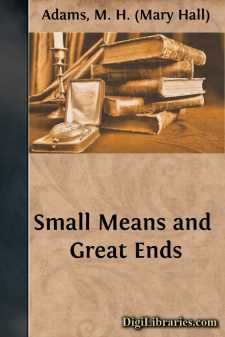Categories
- Antiques & Collectibles 13
- Architecture 36
- Art 48
- Bibles 22
- Biography & Autobiography 813
- Body, Mind & Spirit 142
- Business & Economics 28
- Children's Books 15
- Children's Fiction 12
- Computers 4
- Cooking 94
- Crafts & Hobbies 4
- Drama 346
- Education 46
- Family & Relationships 57
- Fiction 11828
- Games 19
- Gardening 17
- Health & Fitness 34
- History 1377
- House & Home 1
- Humor 147
- Juvenile Fiction 1873
- Juvenile Nonfiction 202
- Language Arts & Disciplines 88
- Law 16
- Literary Collections 686
- Literary Criticism 179
- Mathematics 13
- Medical 41
- Music 40
- Nature 179
- Non-Classifiable 1768
- Performing Arts 7
- Periodicals 1453
- Philosophy 64
- Photography 2
- Poetry 896
- Political Science 203
- Psychology 42
- Reference 154
- Religion 513
- Science 126
- Self-Help 84
- Social Science 81
- Sports & Recreation 34
- Study Aids 3
- Technology & Engineering 59
- Transportation 23
- Travel 463
- True Crime 29
Small Means and Great Ends
Description:
Excerpt
SMALL MEANS AND GREAT ENDS;
OR,
THE WIDOW'S POT OF OIL.
BY JULIA A. FLETCHER.
"Oh! how I do wish I was rich!" said Eliza Melvyn, dropping her work in her lap, and looking up discontentedly to her mother; "why should not I be rich as well as Clara Payson? There she passes in her father's carriage, with her fine clothes, and haughty ways; while I sit here—sew—sewing—all day long. I don't see what use I am in the world!
"Why should it be so? Why should one person have bread to waste, while another is starving? Why should one sit idle all day, while another toils all night? Why should one have so many blessings, and another so few?"
"Eliza!" said Mrs. Melvyn, taking her daughter's hand gently within her own, and pushing back the curls from her flushed brow, "my daughter, why is this? why is your usual contentment gone, and why are you so sinfully complaining? Have you forgotten to think that 'God is ever good?'"
"No, mother," replied the young girl, "but it sometimes appears strange to me, why he allows all these things."
"Wiser people than either you or I have been led to wonder at these things," said Mrs. Melvyn; "but the Christian sees in all the wisdom of God, who allows us to be tried here, and will overrule all for our good. The very person who is envied for one blessing perhaps envies another for one he does not possess. But why would you be rich, my child?"
"Mother, I went this morning through a narrow, dirty street in another part of the city. A group of ragged children were collected round one who was crying bitterly. I made my way through them and spoke to the little boy. He told me his little sister was dead, his father was sick, and he was hungry. Here was sorrow enough for any one; but the little boy stood there with his bare feet, his sunbleached hair and tattered clothes, and smiled almost cheerfully through the tears which washed white streaks amid the darkness of his dirty face. He led me to his home. Oh, mother! if you had been with me up those broken stairs, and seen the helpless beings in that dismal, dirty room you would have wished, like me, for the means to help them. The dead body lay there unburied, for the man said, they had no money to pay for a coffin. He was dying himself, and they might as well be buried together."
"Are you sure, Eliza, that you have not the means to help them?" asked Mrs. Melvyn. "Put on your bonnet, my dear, and go to our sexton. Tell him to go and do what should be done. The charitable society of which I am a member will pay the expense. Then call on Dr.---- the dispensary physician, and send him to the relief of the sick one. Then go to those of your acquaintance who have, as you say, 'bread to waste,' and mention to them this hungry little boy. If you have no money to give these sufferers, you have a voice to plead with those who have; and thus you may bless the poor, while you doubly bless the rich, for 'It is more blessed to give than to receive.'"
Eliza obeyed, and when she returned several hours after, her face glowing with animation, and eagerly recounted how much had been done for the poor family; how their dead had been humanely borne from their sight; how the sick man was visited by the physician, and his bitterness of spirit removed by the sympathy which was sent him; how the room was to be cleaned and ventilated, and how she left the little boy eating a huge slice of bread, while others of the family were half devouring the remainder of the loaf; her mother listened with the same gentleness....


